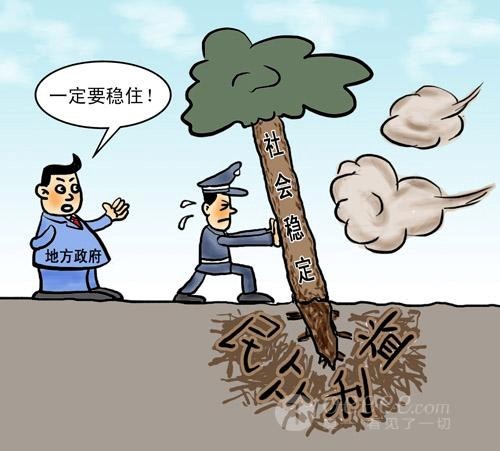Editor’s Note: The Word of the Week comes from China Digital Space’s Grass-Mud Horse Lexicon, a glossary of terms created by Chinese netizens and frequently encountered in online political discussions. These are the words of China’s online “resistance discourse,” used to mock and subvert the official language around censorship and political correctness. If you are interested in participating in this project by submitting and/or translating terms, please contact the CDT editors at CDT [at] chinadigitaltimes [dot] net.
维稳 (wéiwěn): maintain stability

A local official admonishes the policeman, “It must be stabilized!” The roots of the tree of social stability are “the welfare of the people.”
Hand-in-hand with Hu Jintao’s policy to promote “a harmonious society” is an increasing focus on “maintaining stability.” According to the New York Times, the Chinese government budgeted US$111 billion for social stability maintenance in 2012, US$5 billion more than the military budget.
Netizens have their own take on stability maintenance. For example:
When Titanic was first shown on the mainland in 1998, the scene where a naked Rose let Jack sketch her was left alone. Then why was that scene deleted from 2012 screenings? The State Administration of Radio Film and Television (SARFT) has finally provided an explanation: “Considering the unique aspects of 3-D movies, we were concerned that when the movie is shown members of the audience would try to reach out and touch, which would result in unnecessary disputes with those seated in front of them. Given our concerns about maintaining stability, we have decided to delete this scene.”
1998年大陆上映的【泰坦尼克号】保留了Rose裸身让Jack作画的情节,而2012年上映时为何被删除?近日广电总局终于 对此给出了解释:“考虑到3D电影的特殊性,总局担心,播放该片段时可能出现观众试图伸手触摸而打到前排观众的头,造成不必要的纠纷。出于维稳考虑,决定 删除此片段。”








